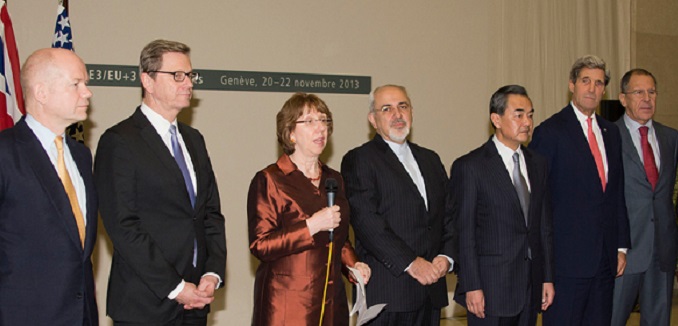American voters from across both political parties and all demographics believe that Congress must have a voice in any final agreement with Iran, favor Congressional legislation that would impose new financial pressure on Tehran, and prefer almost virtually any scenario – including targeted military strikes – to allowing the Islamic Republic to develop nuclear weapons. The national survey, which was conducted by The Mellman Group between January 21-23 and included 800 registered voters, can be found on The Israel Project’s main site here.
Americans disapprove of the Obama administration’s current approach toward negotiating with Iran – which the President is likely to discuss in this evening’s State of the Union address – by a wide margin, 66%-30%. The results are in line with a flurry of other surveys released this month showing the President either underwater or facing majority opposition regarding his Iran policy. A Fox News poll last week found that Americans disapproved of President Obama’s diplomacy with Iran 53%-35% and a recent Washington Post poll measured the spread as 49%-39% disapproval-approval.
The White House’s current strategy has resisted Congressional input in general and specifically fought against Senate legislation that would impose sanctions on Iran in the future if negotiations fail. Americans are on the other side of the administration on both issues: Voters overwhelmingly want Congress to vet the results of comprehensive negotiations (69%-25%) and they want pressure kept up on Iran in the meantime.
Voter sentiments regarding ongoing financial pressure were especially clear. Eighty-three percent of voters overall – and 83% of Democrats – favor using economic sanctions to pressure Iran. Seventy-seven percent of Americans – and 70% of Democrats – want those sanctions maintained or strengthened beyond their current levels. Sixty-two percent of Americans – and 55% of Democrats – believe that Iran should have to “dismantle its nuclear infrastructure and give up the ability to build a nuclear weapons” before sanctions relief should be granted. An overwhelming majority of Americans favor passing the conditional sanctions legislation, the Nuclear Weapon Free Iran Act, that 59 senators have co-sponsored in the face of White House opposition (78%-15%).
Respondents were then read the key arguments used by both supporters and opponents of the legislation:
Supporters of the bipartisan bill say it strengthens diplomacy and increases our chances of peacefully stopping Iran. In fact, it is Congressional sanctions that finally pushed Iran into negotiations, and it is pressure that will keep them there and convince them to compromise. Given Iran’s history of lying about its nuclear program and violating agreements, Iran cannot be trusted. Their threats to walk away from talks are not new and not credible – they need a deal more than we do. Unfortunately, the “interim” agreement has too many loopholes, relieves financial pressure prematurely, and undercuts the leverage we need to end the thread of a nuclear-armed Iran. Passing legislation laying out sanctions should Iran cheat, or refuse a final agreement, balances the interim deal, supports our diplomacy and will help get a good final deal.”
Opponents of the legislation say the interim agreement negotiated between the United States and Iran, and the current diplomatic process to reach a final agreement, is the best way to ensure that Iran will not develop nuclear weapons in the future, and those pushing for more sanctions on Iran are putting the country on a path to war. Part of the agreement states that no new sanctions are to be imposed while the permanent agreement is being negotiated. Therefore, new sanctions now will cause this deal to fall apart and Iran will continue developing nuclear weapons. Moreover, the United States risks losing support from our allies who made these sanctions successful. We can always restore and strengthen sanctions against Iran if things change, but we should give this agreement a chance to work first.
After being offered both sides of the issue, voters still favored legislation triggering new sanctions by more than two-to-one. Sixty-three percent of Americans continued to express support for the new legislation, as did majorities across all parties (55% of Democrats, 65% of Independents, and 71% of Republicans).
Most broadly, the poll reinforced findings from virtually every other survey on the topic: Americans deeply distrust Iran, and want their lawmakers to craft policies that reflect their misgivings over Iranian intentions. Gallup recently noted that U.S. distrust of Iran has been a mainstay of Gallup polling “for more than a generation” and that a previous poll had seen “American name Iran as ‘the greatest enemy of the United States.'” This morning’s poll asked the question directly, generating an 83%-15% split between those who trust and distrust Iran.
The poll even probed U.S. attitudes toward military action via multiple questions. Responses converged on the result that voters would support targeted military strikes if they were necessary to prevent Iran from developing nuclear weapons (68-21% in response to a direct question asking voters to compare the two scenarios).
[Photo: U.S. Department of State / Flickr]




